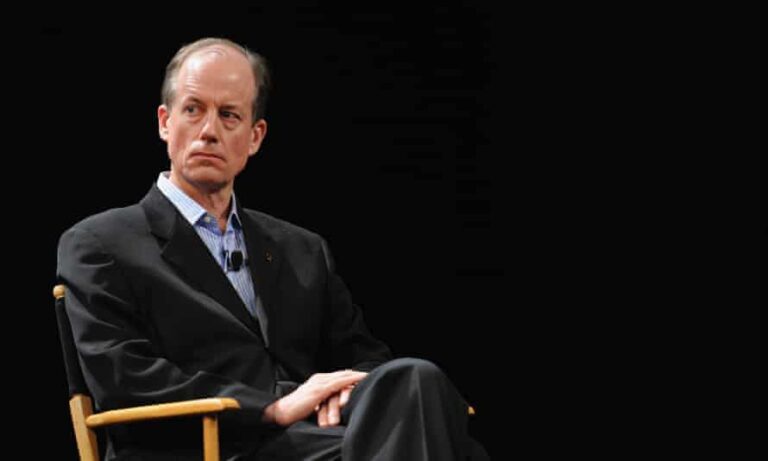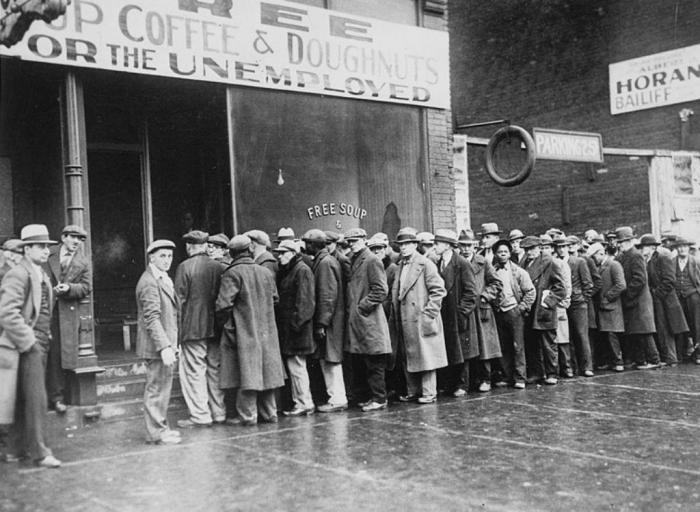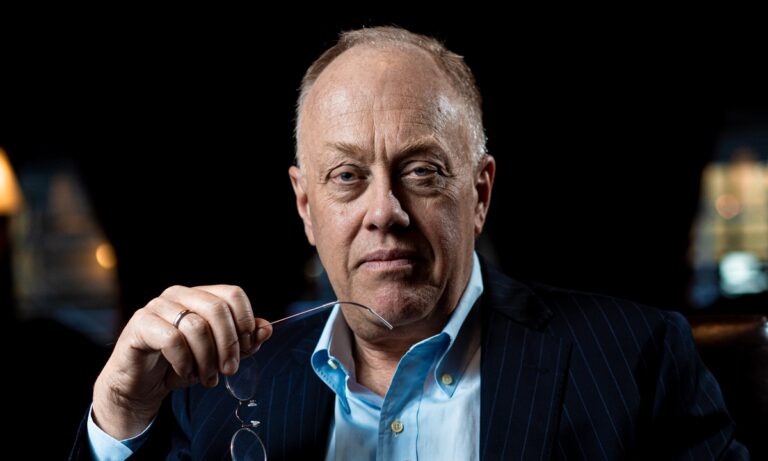This interview was originally published on August 31, 2014. Mr. Johnston, a renowned investigative journalist, says he used to believe if you worked hard, you would prosper, but now, there is a completely different environment.
PAUL JAY, SENIOR EDITOR, TRNN: Welcome to The Real News Network. I’m Paul Jay in Baltimore. And welcome to a new edition of Reality Asserts Itself.
One of my great pleasures in doing this series is I get a chance to talk to people who actually do their homework. A lot of interviews’ subjects, they do some homework, but a lot of it’s kind of general opinion. But it’s a real pleasure to talk to investigative journalists who really do that, actually investigate, uncover, unravel things that we didn’t know before. And in this segment of Reality Asserts Itself, I get to talk to one of America’s leading investigative journalists, certainly one of the leading journalists in its economic matters, and with a long history, including a Pulitzer Prize.
In this Reality Asserts Itself, it’s going to be my pleasure to talk to David Cay Johnston. He’s a lifelong journalist and bestselling author whose recent work explores the causes and conditions of inequality in the United States. His award-winning investigative journalism has taken him through the arcane legislation and regulations to expose how corporations and the wealthy rig the system in their favor and to what lengths they go to evade taxation, all at the expense of the average taxpayer. He won the 2001 Pulitzer Prize for beat reporting, and the committee cited him “for his penetrating and enterprising reporting that exposed loopholes and inequities in the U.S. tax code, which was instrumental in bringing about reforms.” At the Syracuse University College of Law he’s a distinguished visiting lecturer, where he teaches the history of property, taxation, regulation, and commerce. He’s written a trilogy of books on our pro-corporate tax system; the most recent: The Fine Print: How Big Companies Use “Plain English” to Rob You Blind. He’s also editing the forthcoming book Divided: The Perils of Our Growing Inequality and writes regular columns for Al Jazeera America, Tax Analysts, and a weekly piece for Newsweek.
And now joining us in the studio is David Cay Johnston.
Thanks for joining us.
JOHNSTON: Thank you.
JAY: So, as many or most of you know who watch Reality Asserts Itself, we usually start off with a personal story of our interview subject, and that’s what we’re going to do.
So, David, tell us a little bit. You’re born in San Francisco in 1948. This is a little bit of a political biography, shall I say. In 1948, it’s the beginning of the Cold War. It’s McCarthyism. It’s the House Un-American Activities Committee. Were you in a political household? Did people talk about this kind of stuff?
JOHNSTON: Well, my father was a man from New Orleans with a third-grade education who read a book every day. We had a photograph of him till we lost it in a fire having dinner with F.D.R. When I was a little boy–.
JAY: Now, hold on. You weren’t having dinner with F. D. R.
JOHNSTON: My father was having dinner with F. D. R. back in the ’30s when he was a young man. And–.
JAY: Alright. Okay. I got to know. Why is he having dinner with F. D. R.?
JOHNSTON: He was very active in the Young Democrats of Arizona. I think he was president or vice president of it. And so my parents were very aware of things that were in the news. My father had grown up with this third-grade education. He was in the war. He never saw combat, but he became totally disabled. And he worked while I was growing up, but he was disabled, like many people who were disabled continue to work until health stops their ability to do so.
JAY: He was a chef?
JOHNSTON: He became a chef, and he worked up until 1963. And then he died 1969 when I was–just turned 20.
My mother was a disowned heiress, the only child of a very wealthy businessman. She testified against him in a trial in March 1941, where he was being sued for alienation of affection. Imagine today going to a lawyer, saying, oh, this person’s sleeping with my spouse, so I want to sue them for alienation of affection. I don’t think you’d get very far today. But back then, my grandfather was ordered to pay $10,000, and he disowned the star witness against him, my mother.
So I grew up in an unusual household of very bright people.
JAY: And did you grow up knowing this grandfather at all?
JOHNSTON: No. In fact, my existence was hidden from him, and he died when I was, I think, seven years old. So, no, did not know him. Grew up knowing that he had left a very large fortune. And I certainly wasn’t a part of it.
JAY: And nor was your mother.
JOHNSTON: Nor was my mother.
JAY: And your mother must have known this when she testified.
JOHNSTON: She was told she’d get disowned, and she did it anyway. It was sort of the strange person my mother was.
So when I was ten years old and we lived in Mill Valley, California, in a little, tiny rented cabin slung over the side of a hill, I went to work to help the family. And by the time I was 13, we were living in Santa Cruz, where I then grew up. I was working full-time. I had seven newspaper routes, four in the morning and three in the afternoon. And on weekends I washed dishes and mowed lawns and did all sorts of things to sort of help the family.
JAY: So as you’re throwing or handing newspapers over, are you ever thinking, I will be writing in these someday?
JOHNSTON: Actually, the scariest part was I had no idea what I was going to do to make a living. I had no–like millions of young people in America, there was no sort of path to where things were and how you got somewhere. And fortune shined upon me. When I was a senior in high school and I was married and I had a kid, the local weekly paper, which was always shooting my picture ’cause I’d won a speech contest, asked me to write a column and offered to pay me a little bit of money–$0.20 an inch. They liked it, so pretty soon they had me covering the school board and the city council for minimum wage. And one day at the county board of supervisors meeting when I was 18 years old, a reporter from The San Jose Mercury who was filling in for the local guy who was off on vacation slides down the bench next to me, asking what’s going on, during the break takes me to a coffee shop. I literally don’t have a penny in my pocket and I have a hole in the bottom of my shoe. And the following day he told me he had arranged a job interview for me at The San Jose Mercury as a reporter. And I looked at him and I said, “I just graduated from night high school. I’m 18 years old. They’re not going to talk to me.” And he said, “Yes, they are.” So I went over there. They made fun of me for an hour for applying. And I went back and told him how terrible it was, and he said, you go back every three weeks on Friday night until they hire you. And nine months later, they hired me.
JAY: Before we pick up that story–we’re jumping further ahead. I want to back up.
JOHNSTON: Sure.
JAY: Your father–and I’m always interested in the roots of people’s political thinking, which to a large extent at least begins with transmission from their parents, and they either rebel against it, assimilate some of it, or whatever. But your father is an active Democrat. He’s a Roosevelt Democrat. Is he also a Wallace Democrat?
Now, for those of you that have not watched all of our stuff about Wallace, who became later Roosevelt’s vice president, and ’cause by and large Wallace has been left out of most American history, ’cause he was just way too left of center for the current narrative of what America is and was, Wallace was an important piece of what Roosevelt stood for.
JOHNSTON: You know, I couldn’t tell you that. Here’s what I can tell you, that my father, who grew up in New Orleans and then left when he was 19 years old and went West, was furious, absolutely furious about racial discrimination. When the John Cameron Swayze news would come on in the ’50s and whatever civil rights demonstrations, if my father happened to be home at news time he would get my brother and I up out of our chairs, ’cause, you know, they tell you on the news what’s about to come up. He would stand us up in front of the TV and put his hands on the back of our necks, and he would say, you will pay attention to this. And I remember one time we saw hoses turned on young people or something like that, something really awful. My father turned the TV off and he says, you cannot allow this. There before the grace of God go you. You could be poor and black and in the South, and this would be happening to you. So this is about you, and you will do something about this. And in the summer of 1960–.
JAY: Sounds like he could have been a Wallace Democrat.
JOHNSTON: Yeah, well, maybe.
And in the summer of 1963, my father, who the following year voted for Goldwater on the theory that Congress wouldn’t let him get into a big land war and kill his sons, my father sent me to New Orleans on the bus for the summer to stay with his relatives. And I was told to be very clear that we didn’t support their brand of racism. So the first thing I did when my uncle Charlie put me in the car and we went down to the car dealership, a Mercedes dealership, was make a beeline for the water fountain that said “COLORED”. And by the end of the summer, you know, the relatives were all saying I was like my father, I was a little “tetched”.
JAY: Your father is active with F. D. R. at a time when the economic system, capitalism, was in severe crisis. There was a lot of people wondering whether that was–you know, whether that was the end of capitalism. F. D. R. kind of stood for, no, we can fix this, there are policies that can mitigate the excesses of capitalism, there’s a way to have a rational capitalism. Your father grew up with that, and you grew up with that.
JOHNSTON: Well, my father, by the time, you know, I was aware of things, except for the issue of race, I wouldn’t describe as especially overtly political. He certainly was part of the sort of blue-collar American male world, in which the system is not designed to help you, and he certainly believed that unions were crucial. And I know that he taught me about the idea that Adam Smith in The Wealth of Nations figured out, which was that workers should be paid in teams. They work in teams. And, of course, that’s not what we see today. We see that the top five executives of companies typically get about a third of the stock options, and the top 2 percent of executives get all the rest. And he believed in that, and as a chef he would have kitchens with at times over 100 people working for him, and he always–he explained to me when I was young about you had to coordinate all these activities and you had to get people to work together that sometimes don’t like each other.
JAY: So you grow up with a sort of instinct of an outrage against inequality.
JOHNSTON: Yes; no, I think that’s quite true. And on top of that, you know, here’s my mother talking about all the money she doesn’t have and sort of doesn’t understand why, even though it’s, you know, plainly obvious: if you testify against your father, then he’s going to cut you out.
JAY: But was she a window for you? Did she talk much about the world of the rich? I mean, really, I mean–.
JOHNSTON: Oh, yeah, no, my mother would. She had pictures, and she would show us the horses and the house on the lake and the servant. You know, we had films of the servant opening the car and putting her into the car. And–oh, yeah.
JAY: But she marries a working-class guy.
JOHNSTON: Yeah. Yeah. And happily. My parents were happily married.
JAY: And what were her politics? I mean, had she been radicalized by the ’30s herself?
JOHNSTON: Oh, no. She was Republican.
JAY: She was Republican.
JOHNSTON: Oh, yeah. Oh, yeah. She took me to a Nixon rally in 1960 and to a Rockefeller rally. I got to shake hands with Nelson Rockefeller when I was 12 years old or 11 years old.
JAY: Well, did they ever fight about politics? I mean, they don’t sound like on the same page here.
JOHNSTON: No. They fought about things, but not that.
JAY: Not that.
JOHNSTON: Money.
JAY: They fought about money. Not enough.
JOHNSTON: No, not enough.
JAY: Not enough.
JOHNSTON: That’s why I went to work so young.
JAY: Alright. So let’s jump ahead now. Well, you’re born in ’48.
JOHNSTON: Christmas Eve, 12/24/48–doubling numbers.
JAY: By the time you’re ten, ’58, we’re still–you know, we haven’t hit the sort of cultural and political revolutions and transformation of the ’60s, so you’re still in Leave It to Beaver, Cold War kind of mass media. How much do you assimilate of that?
JOHNSTON: Well, remember, 1959 (’cause I was born at the end of the year and I’m ten years old) was when we had the steel strike. And even though the steel strike was in, basically, Pennsylvania and I’m living in Northern California, we felt it. And it was very clear how important back then steel was to the entire industry. We were in an industrial economy. And there were kids I know whose parents lost their jobs because of the–or at least they said they lost them because of the steel strike. And this gave me an awareness of this.
I also had a fundamental belief then–and it’s held up until very recently in time–that we had an abundance of work to do in this country, and that if you worked hard and prospered you’d do just fine. I mean, when I left jobs and I was a young man, even with a bunch of kids, I never once worried about another job. Today is a totally different environment, because we have adopted government policies that are designed to take from the many to enrich the few instead of serving the whole economy.
JAY: Your whole arc is this role, that I’m going to point out what’s really wrong. From that you can start to see how it could be fixed and, you know, potential reforms. And in the end I’m going to ask you, do you actually still believe that’s possible?
And I’ll just–just to tease it a bit–but we ain’t going to do this until the end, really have this out, because we’re going to go through David’s work before we do this, but I had a similar conversation with Ralph Nader, who did an interview like this, and, you know, as a single person causing reforms for the better, it’s hard to find someone who actually accomplished more than Nader.
JOHNSTON: There’s nobody in Ralph’s league.
JAY: Nobody in his league. And I asked him the question, could you still do any of what you did.
JOHNSTON: He probably said not likely.
JAY: No, he said no.
JOHNSTON: Yeah.
JAY: He said flat out no.
JOHNSTON: No, that’s exactly right. The–.
JAY: He said it was an anomaly, a little window in history, and it’s closed.
JOHNSTON: Well, and plus, plus the business people in this world aren’t stupid. They studied Ralph, they co-opted Ralph, they took over Ralph’s techniques, and they used them against the public.
JAY: Alright. We will unravel that and much more of your work in the next segment of Reality Asserts Itself with David Cay Johnston.
Please join us.
Never miss another story
Subscribe to theAnalysis.news – Newsletter
“David Cay Boyle Johnston is an American investigative journalist and author, a specialist in economics and tax issues, and winner of the 2001 Pulitzer Prize for Beat Reporting.”










